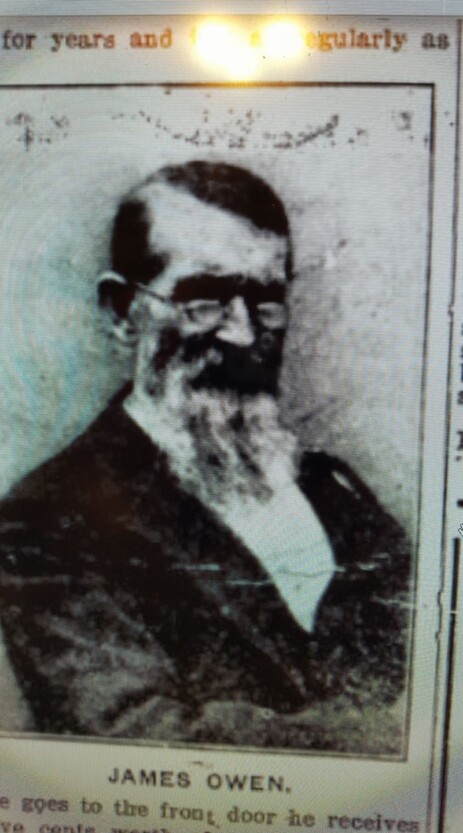Owens - Johnathan
Source: Beckwith, H. W.
History of Montgomery County, Indiana Chicago: H. H. Hill , 1881 p 28.
The
most noted criminal trial that ever took place in Montgomery county was that of
the state against Jonathan S. Owen, who was charged with the murder of his
wife. Owen was a respectable farmer living in the southeastern part of the
county. He was a man in good standing, a consistent member of the church, and
possessed of considerable property. His first wife had died leaving several
children. His second wife was childless and the family relations were not all
harmonious. The stepmother and stepchildren had numerous quarrels, but the
testimony in the case did not show there had ever been any unusual difficulty
between Mr. Owen and his new wife. She had several times threatened to kill
herself on account of the annoyances of her stepchildren. One night late in
1858 she died very suddenly, and was buried the next day. The suddenness of her
death, together with symptoms indicating poison, and other circumstances, soon
began to arouse the suspicions of some of Mrs. Owen's relations, and they
determined to have a resurrection of the body and a post-mortem examination.
This greatly agitated Mr. Owen, and when he found it was fully determined on,
he secretly sold his farm, disguised himself and fled to Canada. The
post-mortem examination showed very conclusively that Mrs. Owen had died from
the effects of strychnine. A large reward was offered for Owen's arrest, and he
was finally captured by William H. Schoolen and others and lodged in the
Crawfordsville jail to await his trial. Hon. D. W. Vorhees, Col. Samuel C.
Wilson, Hon. James Willson and Hon. Joseph E. McDonald, an unusual array of
distinguished counsel, were employed to defend him. The trial came on at
Crawfordsville, at a special term of the circuit court, on July 21, 1859. Hon.
John M. Cowan, then in the beginning of his career as a successful and popular
circuit judge, presided. The prosecution was conducted by Lew Wallace, R. C.
Gregory, and Robert C. Harrison, the prosecuting attorney. This array assured a
judicious, able and unrelenting prosecution. The jury selected and sworn to try
the case was composed of the following citizens: Joseph Allen, Jonathan Todd,
Samuel Davidson, William Royalty, John Blankenship, Jess Vancleave, Joseph
Clifton, Emanuel Burk, James Ames, Jacob Bennett, Daniel Vaughn and Silas A.
Fardy. The trial occupied several days. The court-room was crowded from day to
day, to its utmost capacity. Aside from Owen's conduct subsequent to the death
of his wife, the evidence was barely sufficient to raise a suspicion of his
guilt. It was shown he had bought strychnine at a drug-store in Ladoga some
time before the death of his wife, but this circumstance was fully rebutted by
proof of the facts that he had requested the druggist to charge it an his
account, and that he took it home and gave it to his wife to put away, telling
her to be careful with it, that it was poison to kill rats with. But the secret
sale of the farm, the flight to Canada, and the agitation under disclosure at
the suspicions, all conspired to fix in the public mind an unalterable belief
of his guilt, and to this day it would be folly to suggest to any one, who
lived in the county at the time of the trial, the theory that Mrs. Owen
committed suicide. Yet, a careful consideration of all the testimony, which was
fully reported in the county papers, will leave the impression on the judicial
mind that the theory is not an unreasonable one. The law books are full of
instances showing that innocent men have acted under accusations based upon
circumstances which they feared could not explain, precisely as Mr. Owen did
when accused of the murder of his wife. Few men are so constituted as to be
able to remain perfectly calm in the face of great danger. These things were
dwelt upon by the attorneys for the defense with great ability, and made a
profound impression on the minds of the jury. A verdict of acquittal resulted.
Great indignation was felt and expressed throughout the county at this unlooked
for outcome of the trial. But it would be impossible for any rational being,
who had never heard of the trial, to sit down at this day and read the evidence
without feeling a strong doubt of Owen's guilt. After his acquittal he left the
state, without money and without friends, and has not been heard of since. - transcribed by kbz

